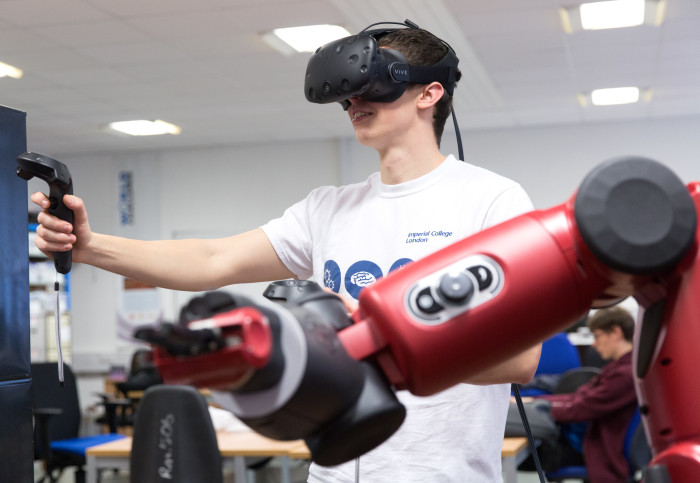Robotics Forum - Amazon PhD Prizes for Outstanding Achievement in Robotics

An exciting collaboration between the Robotics Forum and Amazon that rewards PhD students pursuing outstanding robotics research at Imperial.
From robots to support the ageing population to drones that place sensors under the forest canopy, the Robotics Forum PhD students delivered bar-raising talks featuring the excellent robotics research at Imperial College London.
Thanks to an exciting collaboration between the Robotics Forum and Amazon, a call was opened to reward PhD students pursuing outstanding robotics research at Imperial College London. Numerous applications were received from all corners of the Forum, ranging from the Department of Mechanical Engineering to Bioengineering, amounting to a total of 7 departments and 12 research groups.
Nine finalists were selected in the categories of Early, Mid and Late-stage PhD. They were invited to present their research to a panel composed of Amazon and Robotics Forum representatives. Ultimately, their talks highlighted the diversity and excellence of the robotics research conducted throughout the Forum.
The selection and awards day began with presentations from the Early-stage finalists, who showed remarkable progress and potential in the first months of their PhD:
Maria Raposo De Lima has a keen interest in Social Robotics and Human-Robot Interaction. She is currently working on Robotic Affective Communication Framework for Ageing and Dementia Support at the Biomechatronics Laboratory & UK Dementia Research Institute Care Research and Technology Centre.
Eduardo Candela Garza's research focuses on Scenario Generation and Safety Algorithms for Autonomous Vehicles at the Transport Systems and Logistics Lab and the Personal Robotics Lab. Specifically, he specialises in mathematical modelling and optimisation, and in model implementation with software and hardware.

Fabian Plum enjoys developing new technologies to better understand the world around us. He is currently working on Computational Methods to study the Behaviour of Social Insects at the Evolutionary Biomechanics Group. As part of this work, he developed a fully automated and open-source 3D scanner (scAnt) to digitise small animals and generate large synthetic datasets and was the winner in the Early-stage category.

The Mid-stage presentations included a diverse repertoire of exciting topics, from surgical robots to quadrotor trajectory planning.
Dandan Zhang's research interests lie at the intersection of robotics and machine learning. She works on teleoperation, human-robot shared control, and micro-manipulation for multi-scale robotic surgery at the Hamlyn Centre and the Department of Computing. She was the winner in the Mid-stage category thanks to her thesis work From Teleoperation to Human-Robot Shared Control for Multiscale Robotic Surgery.

Nils Funk is conducting research that focuses on efficient high-resolution mapping for motion planning as well as quadrotor trajectory planning. Currently, he is working on High-Speed Indoor Navigation in Dynamic Environments at the Smart Robotics Lab in the Department of Computing.

Stephen Laws is currently working on robotic-assisted orthopaedic surgery at the Mechatronics in Medicine Laboratory. As part of his thesis, A study of new mechanisms and methods for complex robotic-assisted orthopaedic surgery involving soft tissues, he is working on new vision techniques to improve localisation between patient and robot, as well as developing a new, small, hands-on haptic robot to perform surgery with.

The presentations concluded on a high note as the Late-stage finalists performed a combination of exciting live demos and presentations:
André Tristany Farinha is a final year student at the Aerial Robotics Laboratory. He has an interest in drawing engineering solutions from the natural world, which has lead to his research in hybrid locomotion modes in robotics. As part of his thesis, Micro air vehicles for remote sensing in multi-terrain environments, he is developing Micro Aerial Vehicles that take advantage of these modes to showcase more versatile remote sensing missions in complex environments.

Angus Clark is a PhD student at the REDS Lab (Robotic manipulation: Engineering, Design, and Science Lab), who is introducing a brand-new area of robotics: malleable robots. Through a captivating live demo, he showcased the main contributions of his thesis Continuously bending reconfigurable robot manipulators for flexible handling and assembly in confined and remote environments and was the winner in the Late-stage category.

Liang He is part of the Morph Lab at the Dyson school of design engineering. His PhD research focuses on the Development of a soft robotic approach to improve medical palpation training. As part of this work, he developed an electronic-free training phantom that can simulate different liver physiology and sense the touch of the trainee.

The event concluded with the awards announcement by the Robotics Forum - Amazon selection panel who commended the excellent research and presentations of each of the finalists.
Article text (excluding photos or graphics) © Imperial College London.
Photos and graphics subject to third party copyright used with permission or © Imperial College London.
Reporter
Ana Cruz Ruiz
Department of Mechanical Engineering